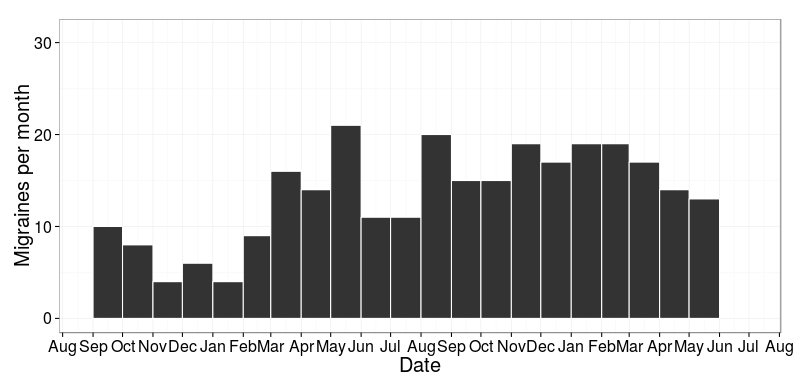June 1, 2014
by sarcozona
3 Comments
In mid-April, I started a new medication for my migraines. I actually tried topamax almost 15 years ago, but had to quit due to the side effects. My current neurologist dosed me up very slowly and took my concerns about being able to speak and read seriously, both minimizing the side effects and making them easier to handle than the first go round.*
It seems to be working. The severity of my migraines is way, way, way down – I’m almost never resorting to my abortive medicines. The frequency has also decreased, though not by that much. I’m still having migraines half the month. But they’re short and not very painful. The decline in frequency is actually so minor that it’s hard to say it’s for sure caused by topamax – the concurrent decline in severity makes me willing to entertain the possibility.  Before topamax, I had a non-triptan medication I would take whenever I felt a migraine coming on that left me able to nap, watch movies, read, putter around the house, and run small errands. My motivation, cleverness, and judgement were not good enough to do much more than that and I was often still relatively light and sound sensitive. About once a week, that medication would fail and I’d have to take a triptan. Topamax reduces the intensity of my migraines enough that I don’t need to use that non-triptan medication very often now and I’m more or less in the same state (though a bit less light-hearted). I’m taking triptans about once a month.
Before topamax, I had a non-triptan medication I would take whenever I felt a migraine coming on that left me able to nap, watch movies, read, putter around the house, and run small errands. My motivation, cleverness, and judgement were not good enough to do much more than that and I was often still relatively light and sound sensitive. About once a week, that medication would fail and I’d have to take a triptan. Topamax reduces the intensity of my migraines enough that I don’t need to use that non-triptan medication very often now and I’m more or less in the same state (though a bit less light-hearted). I’m taking triptans about once a month.
The decrease in intensity from the non-triptan medication and now topamax has meant a big increase in my quality of life, but I still find it nearly impossible to work when I have a migraine, no matter how mild the pain. Even when the pain is the barest twinge, a migraine leaves me unmotivated, unfocused, and stupid. (On the bright side, I’ve watched lots of great movies and read fun novels when I’m like this.) I’ve really got to get the frequency down somehow. I’ve got one more dose increase to go and the medicine could use a little more time to work.
If I don’t get the frequency down, I wonder about asking my doctors for a drug that would help me work when I have a migraine but am not in a ton of pain – if there even is such a thing. Have any of you ever done something like that? Or have any advice for getting shit done with a not-so-bad migraine?
The side effects of my new medicine are also a bit frustrating – the near constant numbness and tingling on random parts of my body is incredibly distracting, and I’m sleeping a lot – 12 or 13 hours a night sometimes. Occasionally I have trouble understanding what I’m reading and I have some trouble with aphasia.
Side effects and weak effect sizes aside, this is the best a medicine has done for me in a long time and I am pleased and excited. I hope hope hope that the side effects fade with time and topamax continues to reduce the frequency of my migraines.
*My old neurologist started me at a high dose and blew me off when I complained about severe problems talking and very uncomfortable paraesthesia. And I lost a lot of weight and got very self conscious. A lot of neurologists treated me like crap when I was poor, chronically ill teenage girl. I write them angry imaginary letters and occasional real angry letters.
